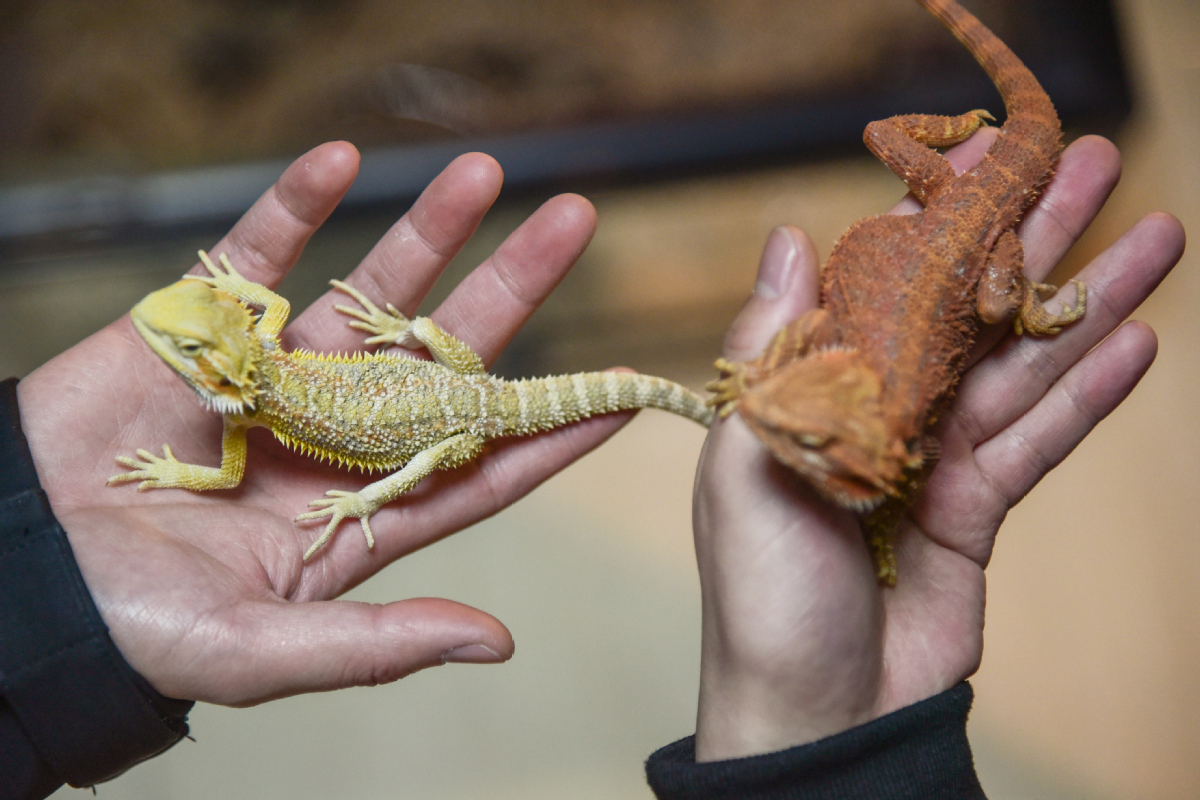Domesticated animal mkt not just 'reigning' cats, dogs


In a world where cats and dogs have long reigned supreme, a quirky and captivating trend has taken the pet community by storm. A growing number of people are breaking free from convention, choosing companionship from animals that are neither feline nor canine, thus redefining what constitutes a pet.
From adorable hedgehogs and jumping spiders to slithering lizards and flying sugar gliders, people are sharing their love for animals in the most extraordinary ways imaginable.
According to statistics released by the Asia Pet Alliance, the number of pets in China reached 220 million in 2022, with about 25 percent of the total being more exotic animals such as birds and reptiles.
Zhang Wencheng, a 29-year-old cafe owner in Jinan, East China's Shandong province, grew up with unusual companions in his childhood, inspired by the wildlife documentaries he avidly watched.
Over the years, Zhang has nurtured his passion, gaining experience in caring for these unique creatures. He has welcomed more than a dozen unconventional pets into his home, covering a diverse range of species, including snakes, tarantulas and geckos, and devoted a cumulative investment exceeding 100,000 yuan ($13,990).
"We live in a society that values individuality and self-expression. Owning an unusual pet has become a way for people like me to showcase a unique personality and stand out from the crowd," Zhang said.
The driving force behind the fast-growing unusual pet market is the younger generation, including the post-1990s and millennials, who exhibit a greater sense of independence, embrace diverse perspectives and always stay at the forefront of the latest trends, said Yuan Zhibin, who has run an unconventional pet store in Beijing for five years.
"The current popular species in the unconventional pet community are snakes, geckos, spiders and frogs," Yuan said, adding that these species have gained popularity among young people primarily due to their relatively low maintenance and cost of care, making them well-suited to the fast-paced lifestyles of today while providing a new form of spiritual fulfillment for the younger generation.
According to a report published by e-commerce platform Tmall, males made up around 60 percent of buyers in the reptile pet market in 2022, with over 40 percent of them being in the 30-39 year-old age bracket.
Furthermore, there has been a rapid growth in the 18 to 24-year-old age group, predominantly being in second and third-tier cities, the report said.
With an increasing number of individuals in search of less-common nonhuman companions, businesses can seize the opportunity to tap into this trend and cater to the distinctive needs and desires of pet enthusiasts, said analysts.
The trend of owning unusual pets has gained significant traction on social media platforms. Pet owners often share their experiences and showcase their extraordinary companions' unique attributes, which will attract more like-minded animal lovers and foster a robust consumer base, said Zhang Yi, chief analyst at iiMedia Research.
Moreover, there is growing demand for specialized supplies and accessories tailored to their unique requirements. From custom-made habitats and specialized enclosures to exotic foods and grooming products, businesses can tap into this niche market and offer a wide range of products that cater to the specific needs of these conventional pets, Zhang added.
For example, intelligent temperature and humidity controllers, according to Tmall's report, are high on reptile and insect keepers' must-buy list, so they can provide their pets with the best possible living conditions, because these animals are extremely sensitive to environmental changes.
Medical care available for unconventional pets, however, still remains limited, and the scarcity makes it difficult for pet owners to access the necessary expertise and guidance, Zhang said, adding that going forward, this is urgently needed to bridge the gap in healthcare services for these unique companions.




































